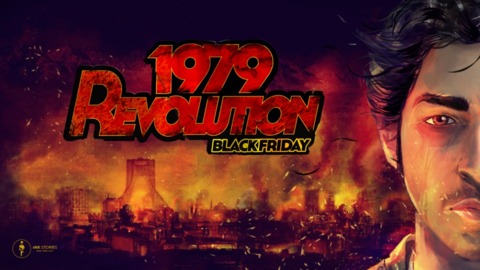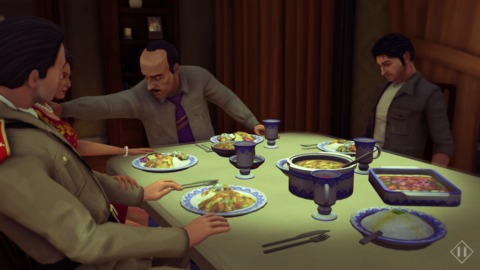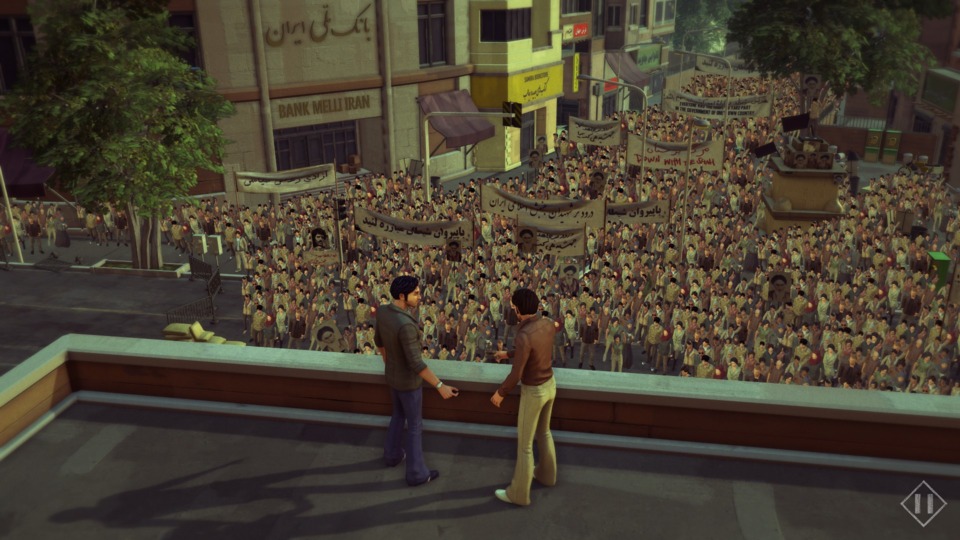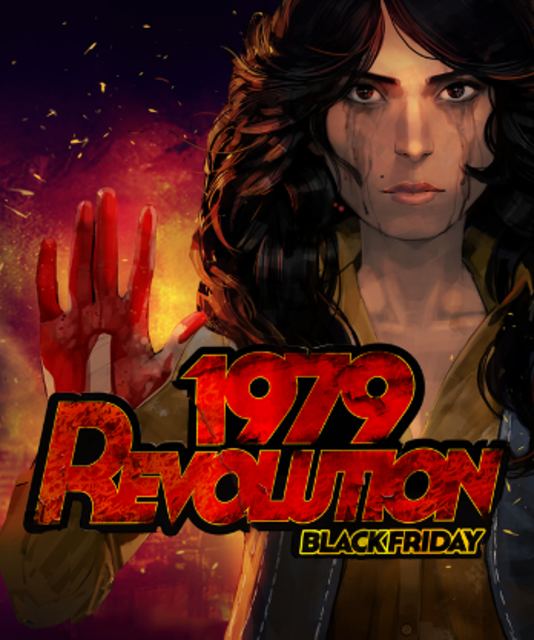
Video games as a learning tool is a concept that is almost as old as the medium itself. It makes sense, as video games encourage a hands-on method of education that books, music, or film can only hint at. A big reason why games can be so effective in this regard is because of the medium’s strength in encouraging empathy. We might not be able to actually walk a mile in another person’s shoes, but we certainly experience a similar, virtual approximation of their lives. But for all the potential in video games to bridge the divide between people, there remains precious few modern games that actually tap into it. 1979 Revolution: Black Friday is a game that attempts to revive this strain of game development. It does so by crafting a compelling piece of historical fiction that sheds new light on an often misunderstood event in modern history. Despite its flaws, the game mostly succeeds and in doing so provides an intriguing new way to present historical events.
1979 Revolution focuses on the story of Reza Shirazi, a young Iranian photography student who returns home from studying abroad on the eve of the Iranian Revolution. While Reza grew up in Iran, his time away has given him enough distance to not be completely familiar with the current political climate in his homeland. His identity as a photographer allows him to view the game’s events through the lens of his camera and it shows how pictures were integral in shaping the revolution. The game uses his point of view very effectively in describing the state of the world to the player. Reza is neither completely enmeshed in the situation nor is he a total outsider, and so he can have other characters explain the current situation to him without it feeling out of character. Furthermore, the game can indulge in discussing the nuances of Iranian art, music, food and social dynamics in an organic way. For instance, in one scene Reza comes across some old family films of his parents partaking in various Persian holidays and activities, and he’s able to internally narrate the events that serve to educate the player. The game also doesn’t shy away from peppering Persian words and phrases into the dialog and respects the player’s capacity to understand what is said based on context.

It’s the willingness to take the time to learn about the people of Iran that makes the game something special. Through dialog with other characters and investigating the environment, the player learns more about the everyday lives of Iranians going through this tumultuous time. We begin to understand the internal conflict that young Iranians felt, torn between the prosperity and global culture offered by the Western-backed Shah and the traditional teachings and freedom offered by the independent Ayatollah Khomeini. Reza is pulled in different directions by those around him, including his status-quo supporting brother Hossein, his peaceful revolution supporting best friend Babak, and his violent revolution supporting cousin Ali. The dialog can stumble a bit here, as there are times where these characters will simply shout their side’s point of view at one another until Reza makes a choice. These moments feel artificial and took me out of the experience, although thankfully they don’t happen often.
The game clearly takes inspiration from Telltale’s school of design, and one can be forgiven for thinking it came from that studio. From the way branching dialog works to the structure of quick time events, if you’ve played The Walking Dead or The Wolf Among Us you’ll know exactly what to expect. But while 1979 Revolution takes from those games’ strengths, it also inherits their weaknesses. The quick time events in particular disrupt the flow of the story as the windows of successful inputs are laughably short. I don’t think I was able to pass a single one of these sequences on the first try as I had to memorize the inputs in order to press them in time. Additionally, the game telegraphs player choice a little too much and offers only the smallest of consequences based on player input.
Some of these shortcomings can be attributed to the game’s small budget. 1979 Revolution does not have the highest production values, and on occasion this shows up on the screen with awkward character animations, occasional blurry textures, and an ending that feels hastily cut. Still, the team at iNK Stories manage to craft a presentation that serves the narrative for the most part. One standout moment has Reza and Babak standing on a rooftop watching hundreds of demonstrators shouting in the streets. Whatever technical wizardry needed to make that scene happen was absolutely worth it, and it got me fully swept up in the revolutionary emotions in the air during that fateful September.

When they have covered past real world events, video games have tended to focus on the bigger picture of history. One can look at franchises like Civilization and Age of Empires to see the emphasis on the national and international factors influencing history, but this is also true for smaller scale games. World War II games like Call of Duty or Medal of Honor, for instance, put you in the role of faceless soldiers who are merely focused on the battles themselves, and not how the horrors of war affect them as individuals. And these games typically say nothing of the civilian experience during these times, outside of window dressing to make the setting feel “real”. Certainly, while games like Valiant Hearts exist to tell more personal stories, they are the exception rather than the norm. But these individual stories are what make history come alive, and video games are uniquely suited to present them effectively. 1979 Revolution is not a perfect game, but it shows the potential for this medium to shed new light on misunderstood historical events through an empathetic lens. It demonstrates what a team can do with a unique perspective, a passion to tell their story, and the resources to bring their vision to life. I only hope that others follow the path iNK Stories has forged to tell their own stories. Until then, I can come away from 1979 Revolution knowing a little more about the politics, the people, and the circumstances that led to such a pivotal 20th century event.
Note: I found out about 1979 Revolution: Black Friday through a recent episode of Extra Credits. The video provides a fantastic breakdown of how and why the game succeeds in educating the player. You can check it out here.

Log in to comment